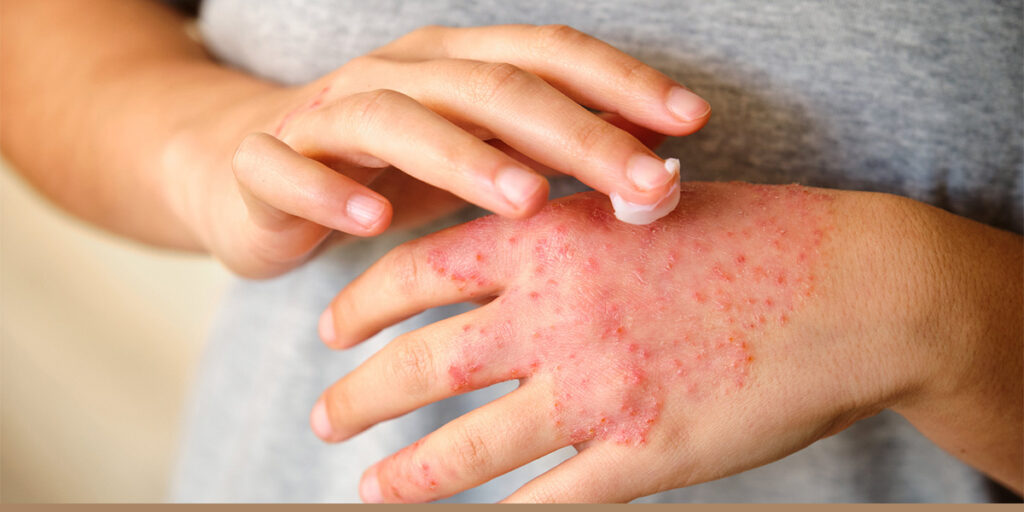Eczema, or atopic dermatitis, is a common skin condition affecting 10%-30% of children and 2%-10% of adults in the United States. This chronic inflammatory skin disease is characterized by dry, itchy skin that sometimes weeps a clear fluid. While it often first appears during childhood, it can also appear later in adulthood.
Although the specific cause of eczema is not understood, several known triggers can result in a rash or aggravate an existing flare-up. Book an appointment with Berman Skin Institute to get to the root of your triggers and find relief.
What Causes Eczema Flare-Ups?
There are several types of eczema, with atopic dermatitis being the most common. A mild case of eczema may just cause some itchiness and flaking skin, but significant flare-ups can lead to complications like bacterial or viral infections. Some cases of eczema are short-term, while other individuals may experience eczema for months or even years at a time.
While it causes a skin reaction, eczema isn’t actually an allergy, nor is it caused by a specific trigger. Instead, it is an inflammatory reaction of the skin resulting from a variety of causative agents. Coming in contact with a certain fragrance or consuming a specific ingredient could cause a sensitive immune system to react, resulting in a new outbreak or worsening an existing condition.
What Are Eczema Triggers?
If someone has an overly sensitive immune system, “triggering” events such as coming in contact with or consuming a specific substance can stimulate certain antibodies. When this happens, immune system cells will release inflammatory agents, resulting in chronic inflammation of the skin.
Several contributing factors may lead to an eczema outbreak. In children, factors ranging from exposure to dust mites to consuming protein-rich foods can be triggering events. Adults may experience a reaction if they are wearing irritating clothing, menstruating, experiencing dehydrated skin or undergoing emotional stress.
Exacerbating factors can vary from person to person. No matter what triggers an eczema response, though, scratching or rubbing the affected area can make it worse and prevent the skin from healing.
4 Ways to Prevent Eczema Flare-Ups and Manage Symptoms
While eczema can’t always be prevented, there are several ways to minimize your chances of a flare-up and manage your symptoms.
1. Keep a Food Journal
Some foods can trigger an eczema reaction. Because it can be difficult to narrow down which foods are the culprit, consider keeping a food journal. Each day, record everything that you eat and note whether you experience a reaction. If you find that a specific food aggravates your eczema, include the extent to which your symptoms flare up after consuming it.
Over time, your food journal can start to show you patterns between what foods you may be reacting to. If you begin to notice a potential trigger, remove that food from your diet for a few weeks and see how your eczema responds.
2. Avoid Exposure to Extreme Temperatures
Hot and cold air can potentially trigger an eczema flare-up. Even though you can’t control the weather, you can take steps to avoid exposure to extreme temperatures throughout the year. During the summer, sweating can be a culprit, so try to minimize activity during the hottest parts of the day. In the winter, make sure your skin is protected under soft, breathable layers, and keep your skin moisturized so it doesn’t dry out and get itchy.
3. Stay Away From Harsh Chemicals and Fragrances
Every day, you use personal care products like soaps, shampoos and conditioners, as well as cleaning products like dish soaps. If these products contain harsh dyes, chemicals and fragrances, they could trigger an eczema flare-up. Instead, opt for gentle, unscented personal products made from high-quality ingredients. Additionally, choose biodegradable, eco-friendly cleaners with natural-based scents.
4. Manage Stress
Getting adequate sleep and engaging in some physical activity each day can help you better manage stress and reduce inflammation in the body. There are different ways you can decompress and let your body unwind. Consider trying the following:
- Breathing exercises
- Meditation
- Therapy
- Activities like yoga and tai chi
FAQs About Eczema Flare-Ups
Interested in learning more about potential triggers that could cause an eczema flare-up? Check out a few frequently asked questions to learn more.
What Food Causes Eczema Flare-Ups?
While any food could cause a reaction, foods with inflammatory qualities are more likely to lead to a flare-up. These include:
- Foods high in sugar
- Refined carbs
- Red meat
- Dairy
- Gluten
Opting for simple, fresh foods — instead of ones with a long ingredient list or hard-to-read, scientific-sounding names — can help reduce the chances of an eczema flare-up.
Can Stress Cause Eczema?
Whenever the body experiences stress, it releases the hormone cortisol, which triggers inflammation throughout the body. Even though stress doesn’t directly cause eczema, this inflammation can trigger symptoms, exacerbate a flare-up and prevent healing.
Does the Sun Make Eczema Worse?
Individuals experiencing eczema may find that the sun either helps or hinders their condition. For those dealing with weeping eczema, sunlight may help dry out the skin, allowing it to heal. Others may find that the change in temperature and increased sunlight makes eczema worse. This is especially true for those with photosensitive dermatitis.
When to Consult a Dermatologist
While there are several ways to manage eczema at home, this condition often requires specialized intervention. If eczema isn’t responding to at-home treatments or is worsening, you should consult a dermatologist for professional help. Excessive itching can cause the skin to open and become infected. When this happens, you’ll start experiencing symptoms such as blistered skin, fluid drainage, or white or yellow pus — and even symptoms that mimic the flu.
A dermatologist can assess your condition and create a treatment plan to help you manage it. With several eczema treatment options available, like the Excimer Laser, Narrow Band UVB Light Therapy and prescription medications, dermatologists can help you find the right solution to reduce itchiness and heal your skin.
Heal Your Eczema With the Best Possible Dermatologic Care
At the Berman Skin Institute, we understand how challenging it can be to deal with eczema. At our dermatology and cosmetic surgery center, our providers can help you effectively manage eczema and alleviate it over time.
We have several locations throughout Northern California, making it more convenient than ever to find the skin treatments you need. Our team serves the following areas and more:
- Roseville
- Palo Alto
- Walnut Creek
- San Francisco
- Sacramento
- Fremont
With our commitment to combining state-of-the-art medical technology and research with patient welfare and healing, you can feel confident knowing you’ll always receive the best possible dermatologic care.
To learn more about our skin treatment services and how we can help you heal your eczema, schedule an appointment today.






